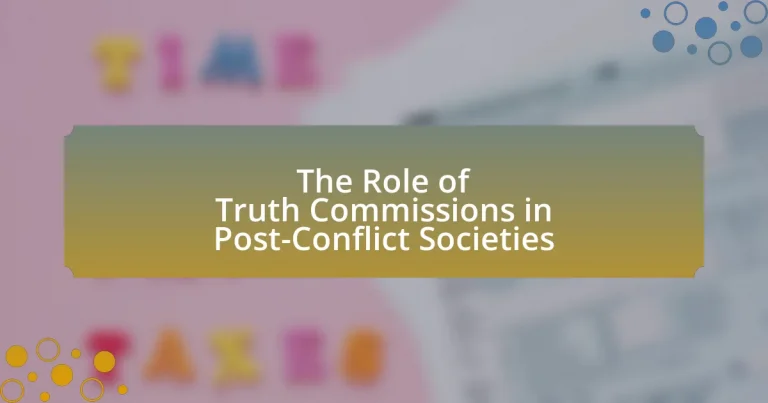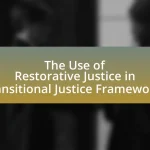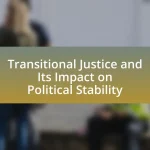Truth commissions are official bodies established to investigate and document human rights violations in post-conflict societies, aiming to promote reconciliation, establish historical records, and provide a platform for victims to share their experiences. This article examines the purpose, functioning, and key objectives of truth commissions, highlighting their role in addressing past injustices and fostering societal healing. It also discusses the challenges these commissions face, including political resistance and resource limitations, and evaluates their effectiveness in promoting accountability and influencing legal reforms. Additionally, the article explores best practices for enhancing the outcomes of truth commissions and the lessons learned from successful examples worldwide.

What are Truth Commissions and their Purpose in Post-Conflict Societies?
Truth commissions are official bodies established to investigate and document human rights violations that occurred during periods of conflict or authoritarian rule. Their primary purpose in post-conflict societies is to promote reconciliation, establish a historical record, and provide a platform for victims to share their experiences, thereby fostering healing and preventing future atrocities. For example, the South African Truth and Reconciliation Commission, established in 1995, aimed to address the injustices of apartheid by uncovering the truth about past abuses and facilitating a peaceful transition to democracy. This approach has been shown to contribute to societal healing and the establishment of rule of law in post-conflict environments.
How do Truth Commissions function in the context of post-conflict societies?
Truth Commissions function in post-conflict societies by investigating and documenting human rights violations that occurred during periods of conflict, aiming to promote reconciliation and healing. These commissions gather testimonies from victims and perpetrators, analyze evidence, and produce reports that detail findings and recommendations for accountability and reform. For example, the South African Truth and Reconciliation Commission, established in 1995, played a crucial role in addressing the atrocities of apartheid by allowing victims to share their experiences, which facilitated national healing and the establishment of a democratic society. This process not only acknowledges past injustices but also seeks to prevent future violations by promoting a culture of accountability and transparency.
What are the key objectives of establishing a Truth Commission?
The key objectives of establishing a Truth Commission include uncovering the truth about past human rights violations, promoting accountability for perpetrators, fostering national reconciliation, and providing a platform for victims to share their experiences. Truth Commissions aim to document and acknowledge the suffering caused by state or non-state actors, which is essential for healing and rebuilding trust in post-conflict societies. Historical examples, such as the South African Truth and Reconciliation Commission, illustrate how these objectives can lead to societal healing and the prevention of future atrocities by addressing grievances and promoting dialogue.
How do Truth Commissions differ from other forms of transitional justice?
Truth Commissions differ from other forms of transitional justice primarily in their focus on uncovering the truth about past human rights violations rather than pursuing criminal prosecutions or reparations. While mechanisms like trials aim to hold perpetrators accountable through legal proceedings, Truth Commissions prioritize documenting experiences, acknowledging victims, and fostering national reconciliation. For instance, the South African Truth and Reconciliation Commission, established in 1995, aimed to address the atrocities of apartheid by collecting testimonies and promoting healing rather than solely punishing offenders. This approach emphasizes restorative justice, which contrasts with the retributive justice often seen in criminal trials.
Why are Truth Commissions important for reconciliation?
Truth Commissions are important for reconciliation because they provide a platform for victims and perpetrators to share their experiences, fostering understanding and acknowledgment of past injustices. This process helps to uncover the truth about human rights violations, which is essential for healing and rebuilding trust within communities. For instance, the South African Truth and Reconciliation Commission, established in 1995, played a crucial role in addressing the atrocities of apartheid by documenting testimonies and promoting national dialogue, which contributed to a more peaceful transition to democracy. By facilitating open discussions and recognizing the suffering of victims, Truth Commissions create a foundation for restorative justice, ultimately aiding in the reconciliation process.
What role do they play in addressing past human rights violations?
Truth commissions play a crucial role in addressing past human rights violations by investigating and documenting abuses, promoting accountability, and fostering reconciliation. They provide a platform for victims to share their experiences, which helps to validate their suffering and acknowledge the injustices they faced. For instance, the South African Truth and Reconciliation Commission, established in 1995, uncovered thousands of human rights violations during apartheid, contributing to national healing and the establishment of a historical record. This process not only aids in the pursuit of justice but also serves to educate society about the past, preventing future violations.
How do Truth Commissions contribute to societal healing?
Truth Commissions contribute to societal healing by facilitating the acknowledgment of past atrocities and fostering dialogue among affected communities. These commissions investigate human rights violations, allowing victims to share their experiences, which promotes recognition and validation of their suffering. For instance, the South African Truth and Reconciliation Commission, established in 1995, documented over 21,000 human rights violations, helping to create a shared historical narrative that encourages collective healing. By promoting accountability and transparency, Truth Commissions also help to rebuild trust in institutions, which is essential for long-term peace and reconciliation in post-conflict societies.
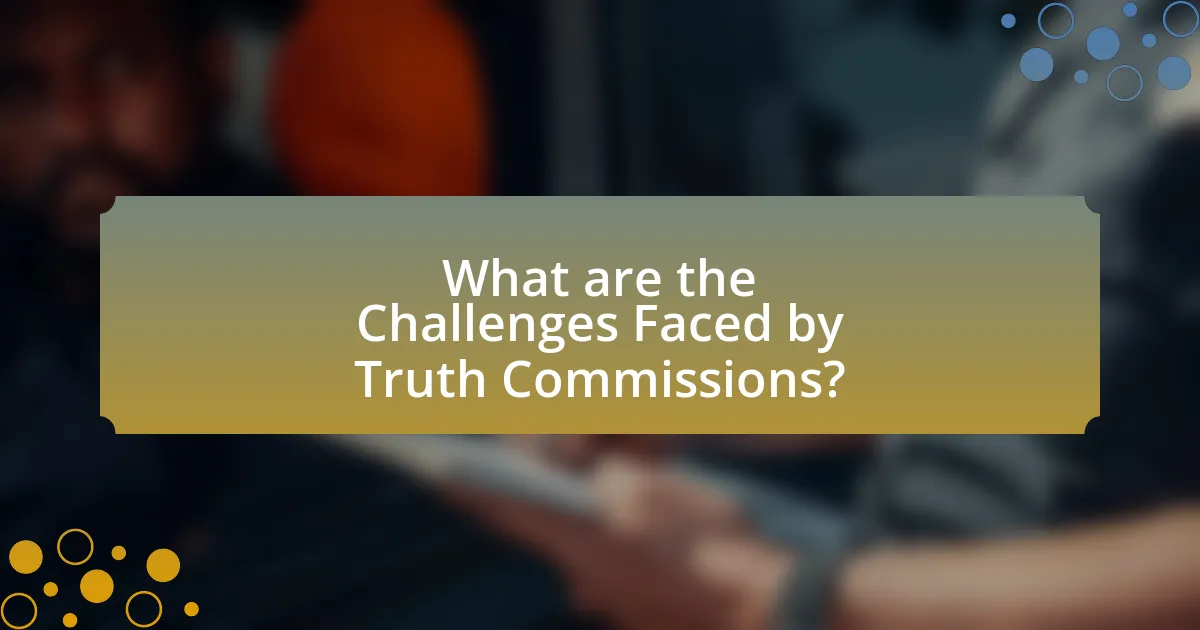
What are the Challenges Faced by Truth Commissions?
Truth commissions face several challenges, including political resistance, lack of resources, and issues of credibility. Political resistance often arises from governments or groups that fear accountability for past actions, which can hinder the commission’s ability to operate effectively. For instance, in South Africa, the Truth and Reconciliation Commission encountered pushback from certain political factions that were reluctant to confront their past. Additionally, limited financial and human resources can restrict the scope and depth of investigations, as seen in the case of the El Salvador Truth Commission, which struggled with insufficient funding. Credibility issues may also emerge if the commission is perceived as biased or lacking independence, undermining public trust; this was evident in the case of the Guatemalan Historical Clarification Commission, where skepticism about its impartiality affected its findings. These challenges can significantly impact the effectiveness and outcomes of truth commissions in post-conflict societies.
What obstacles do Truth Commissions encounter in their operations?
Truth Commissions encounter several obstacles in their operations, including lack of political support, insufficient funding, and challenges in gathering credible testimonies. Political support is crucial, as governments may resist transparency or accountability, undermining the commission’s authority. For instance, in countries like Argentina and South Africa, political pushback has hindered the effectiveness of truth-telling processes. Insufficient funding can limit the scope and reach of investigations, as seen in the case of the Sierra Leone Truth and Reconciliation Commission, which struggled with budget constraints. Additionally, gathering credible testimonies is often complicated by fear of reprisal among witnesses, as evidenced in the case of the El Salvador Truth Commission, where many victims were reluctant to come forward due to safety concerns. These obstacles collectively impede the ability of Truth Commissions to fulfill their mandate effectively.
How do political dynamics affect the effectiveness of Truth Commissions?
Political dynamics significantly influence the effectiveness of Truth Commissions by shaping their mandate, public perception, and the willingness of stakeholders to cooperate. For instance, in countries where political leaders support the commission’s objectives, such as South Africa during its transition from apartheid, Truth Commissions can effectively promote reconciliation and accountability. Conversely, in politically unstable environments, like in Guatemala, where the government resisted the commission’s findings, the effectiveness of Truth Commissions diminishes, leading to limited public trust and insufficient follow-through on recommendations. The political will to address past injustices directly correlates with the commission’s ability to achieve its goals, as evidenced by varying outcomes in different national contexts.
What are the common criticisms of Truth Commissions?
Common criticisms of Truth Commissions include their perceived ineffectiveness in delivering justice, potential for selective truth-telling, and the risk of undermining legal accountability. Critics argue that Truth Commissions often fail to hold perpetrators accountable, as seen in the South African Truth and Reconciliation Commission, where many offenders received amnesty. Additionally, the process may prioritize certain narratives over others, leading to accusations of bias and exclusion, which can exacerbate societal divisions. Furthermore, some scholars, like Priscilla Hayner, highlight that Truth Commissions may inadvertently legitimize human rights violations by focusing on reconciliation rather than punishment, thus raising ethical concerns about their role in post-conflict societies.
How can Truth Commissions ensure inclusivity and representation?
Truth Commissions can ensure inclusivity and representation by actively engaging diverse community stakeholders throughout their processes. This engagement includes conducting outreach to marginalized groups, such as ethnic minorities, women, and victims of violence, to gather their testimonies and perspectives. For instance, the South African Truth and Reconciliation Commission included a wide range of voices by holding public hearings across various regions, which allowed for a more comprehensive understanding of the societal impact of apartheid. Additionally, employing a diverse team of commissioners and staff can help reflect the demographics of the society, fostering trust and encouraging broader participation. Research indicates that inclusive practices in truth commissions lead to more effective reconciliation outcomes, as seen in the experiences of countries like Rwanda and Sierra Leone, where efforts to include various societal segments were pivotal in addressing grievances and promoting healing.
What strategies can be employed to engage marginalized communities?
To engage marginalized communities, strategies such as inclusive dialogue, community-led initiatives, and targeted outreach programs can be employed. Inclusive dialogue involves creating safe spaces for open communication, allowing marginalized voices to be heard and valued. Community-led initiatives empower individuals from these communities to take charge of projects that address their specific needs, fostering ownership and trust. Targeted outreach programs ensure that information and resources reach marginalized groups effectively, often utilizing local leaders or organizations to bridge gaps. Research indicates that these strategies enhance participation and foster a sense of belonging, which is crucial for successful engagement in post-conflict societies.
How do Truth Commissions address gender-based violence in their findings?
Truth Commissions address gender-based violence by systematically documenting and acknowledging the experiences of survivors, thereby validating their suffering and promoting accountability. These commissions often include specific mandates to investigate gender-based violence, collect testimonies from victims, and analyze patterns of abuse within the context of broader human rights violations. For instance, the Truth and Reconciliation Commission in South Africa explicitly recognized sexual violence as a critical issue, leading to recommendations for reparations and policy changes. This approach not only highlights the prevalence of gender-based violence but also emphasizes the need for societal change and legal reforms to prevent future occurrences.
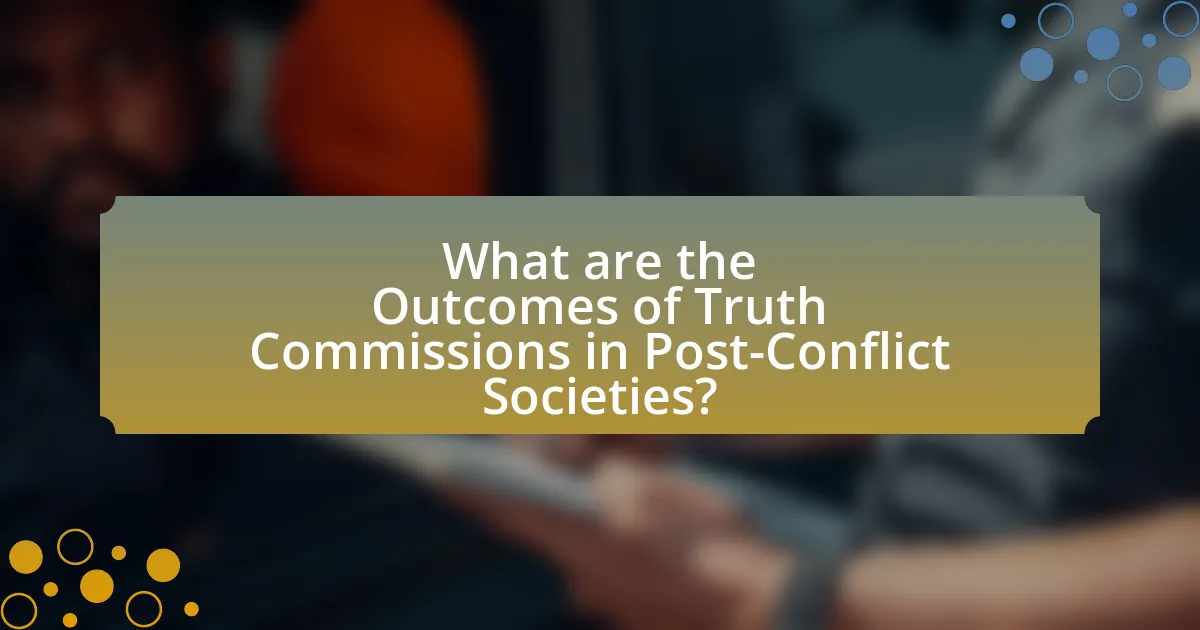
What are the Outcomes of Truth Commissions in Post-Conflict Societies?
Truth commissions in post-conflict societies primarily aim to uncover the truth about past human rights violations and foster reconciliation. These commissions often lead to several key outcomes: acknowledgment of victims’ suffering, establishment of historical records, promotion of accountability, and facilitation of societal healing. For instance, the South African Truth and Reconciliation Commission, established in 1995, documented over 21,000 human rights violations, which helped to validate the experiences of victims and promote national healing. Additionally, truth commissions can influence legal reforms and contribute to the prevention of future conflicts by addressing root causes of violence.
What are the measurable impacts of Truth Commissions on societies?
Truth Commissions have measurable impacts on societies, primarily through promoting reconciliation, establishing historical narratives, and facilitating legal accountability. For instance, the South African Truth and Reconciliation Commission led to a significant increase in public awareness of human rights violations, with over 21,000 statements collected from victims and perpetrators, fostering a collective memory that aids in healing societal wounds. Additionally, studies indicate that countries with Truth Commissions, such as Argentina and Chile, experience lower rates of reoccurring violence compared to those without such mechanisms, suggesting a correlation between truth-telling processes and long-term peace. Furthermore, the establishment of legal frameworks for accountability, as seen in the cases of Sierra Leone and Liberia, has resulted in prosecutions of war criminals, reinforcing the rule of law and deterring future atrocities.
How do Truth Commissions influence legal reforms and policy changes?
Truth Commissions influence legal reforms and policy changes by providing a platform for victims to share their experiences, which often leads to the identification of systemic injustices and the need for legal accountability. For instance, the South African Truth and Reconciliation Commission highlighted human rights violations during apartheid, prompting legislative changes such as the Promotion of National Unity and Reconciliation Act. This act not only established the commission but also laid the groundwork for policies aimed at addressing past injustices, thereby influencing the legal framework of the country. Additionally, the findings of Truth Commissions often serve as a basis for new laws aimed at preventing future violations, as seen in countries like Chile and Argentina, where commissions led to reforms in military and police conduct.
What long-term effects do Truth Commissions have on national identity?
Truth Commissions have significant long-term effects on national identity by fostering reconciliation and promoting a shared narrative of the past. These commissions often uncover historical injustices and provide a platform for victims to share their experiences, which can lead to a collective understanding of the nation’s history. For example, the South African Truth and Reconciliation Commission, established in 1995, played a crucial role in shaping a new national identity post-apartheid by acknowledging the suffering caused by racial segregation and promoting a vision of unity and healing. This process can help to mitigate divisions within society, as it encourages dialogue and recognition of diverse experiences, ultimately contributing to a more cohesive national identity.
How can the effectiveness of Truth Commissions be evaluated?
The effectiveness of Truth Commissions can be evaluated through criteria such as public participation, the extent of truth revealed, impact on reconciliation, and the implementation of recommendations. Public participation is crucial, as higher engagement often correlates with greater legitimacy and acceptance of findings. The extent of truth revealed can be assessed by the volume and significance of testimonies collected, which reflects the commission’s ability to uncover historical injustices. Impact on reconciliation can be measured through surveys and studies that analyze societal attitudes before and after the commission’s work, indicating shifts in community relations. Lastly, the implementation of recommendations can be tracked through governmental and institutional actions taken in response to the commission’s findings, demonstrating the practical influence of the commission’s work on policy and societal change.
What indicators can be used to assess the success of a Truth Commission?
Indicators used to assess the success of a Truth Commission include public acceptance, the extent of victim participation, the quality of the reports produced, and the implementation of recommendations. Public acceptance can be measured through surveys indicating trust in the commission’s findings. Victim participation is assessed by the number of individuals who engage with the commission, reflecting its outreach and inclusivity. The quality of reports is evaluated based on their comprehensiveness and the accuracy of the historical narrative presented. Finally, the implementation of recommendations is tracked through follow-up actions taken by governments or institutions, demonstrating the commission’s impact on policy and societal change.
How do public perceptions shape the legacy of Truth Commissions?
Public perceptions significantly shape the legacy of Truth Commissions by influencing their credibility, acceptance, and the extent to which their findings are integrated into societal narratives. When the public views a Truth Commission as legitimate and impartial, it fosters trust in the process, leading to greater acknowledgment of the commission’s findings and recommendations. For instance, the South African Truth and Reconciliation Commission is often cited as a successful model because it was perceived as a fair and inclusive process, which helped in the broader acceptance of its outcomes and contributed to national healing. Conversely, if public perception is marred by skepticism or allegations of bias, the commission’s findings may be dismissed, undermining its potential impact on reconciliation and justice. This dynamic illustrates that the legacy of Truth Commissions is not solely determined by their official reports but is also deeply intertwined with how they are perceived by the communities they aim to serve.
What best practices can enhance the effectiveness of Truth Commissions?
Best practices that can enhance the effectiveness of Truth Commissions include ensuring broad public participation, maintaining independence from political influence, and providing adequate resources for operations. Broad public participation fosters trust and legitimacy, as seen in South Africa’s Truth and Reconciliation Commission, which engaged various community stakeholders. Independence from political influence is crucial; for instance, the Peruvian Truth and Reconciliation Commission operated effectively due to its autonomy from government pressures. Adequate resources, including funding and trained personnel, are essential for thorough investigations and outreach, as demonstrated by the successful operations of the Sierra Leone Truth and Reconciliation Commission, which had sufficient backing to conduct extensive hearings and documentation.
How can stakeholder engagement improve the outcomes of Truth Commissions?
Stakeholder engagement can significantly improve the outcomes of Truth Commissions by fostering inclusivity and ensuring diverse perspectives are represented. When stakeholders, including victims, community leaders, and civil society organizations, actively participate, the commission can gather comprehensive testimonies that reflect the complexities of the conflict. This engagement enhances the legitimacy of the commission’s findings, as seen in the South African Truth and Reconciliation Commission, where broad participation helped to address historical injustices and promote national healing. Furthermore, involving stakeholders in the process can lead to greater public trust and acceptance of the commission’s recommendations, ultimately facilitating reconciliation and preventing future conflicts.
What lessons can be learned from successful Truth Commissions worldwide?
Successful Truth Commissions worldwide demonstrate the importance of inclusivity, transparency, and accountability in addressing past human rights violations. These commissions, such as South Africa’s Truth and Reconciliation Commission, highlight that involving diverse societal groups fosters broader acceptance of findings and promotes healing. Transparency in processes, as seen in the Sierra Leone Truth and Reconciliation Commission, builds public trust and encourages participation. Furthermore, accountability mechanisms, like those implemented in the Chilean National Commission on Truth and Reconciliation, ensure that perpetrators are held responsible, which is crucial for deterring future abuses. These lessons underscore that effective Truth Commissions can facilitate national reconciliation and contribute to sustainable peace in post-conflict societies.
